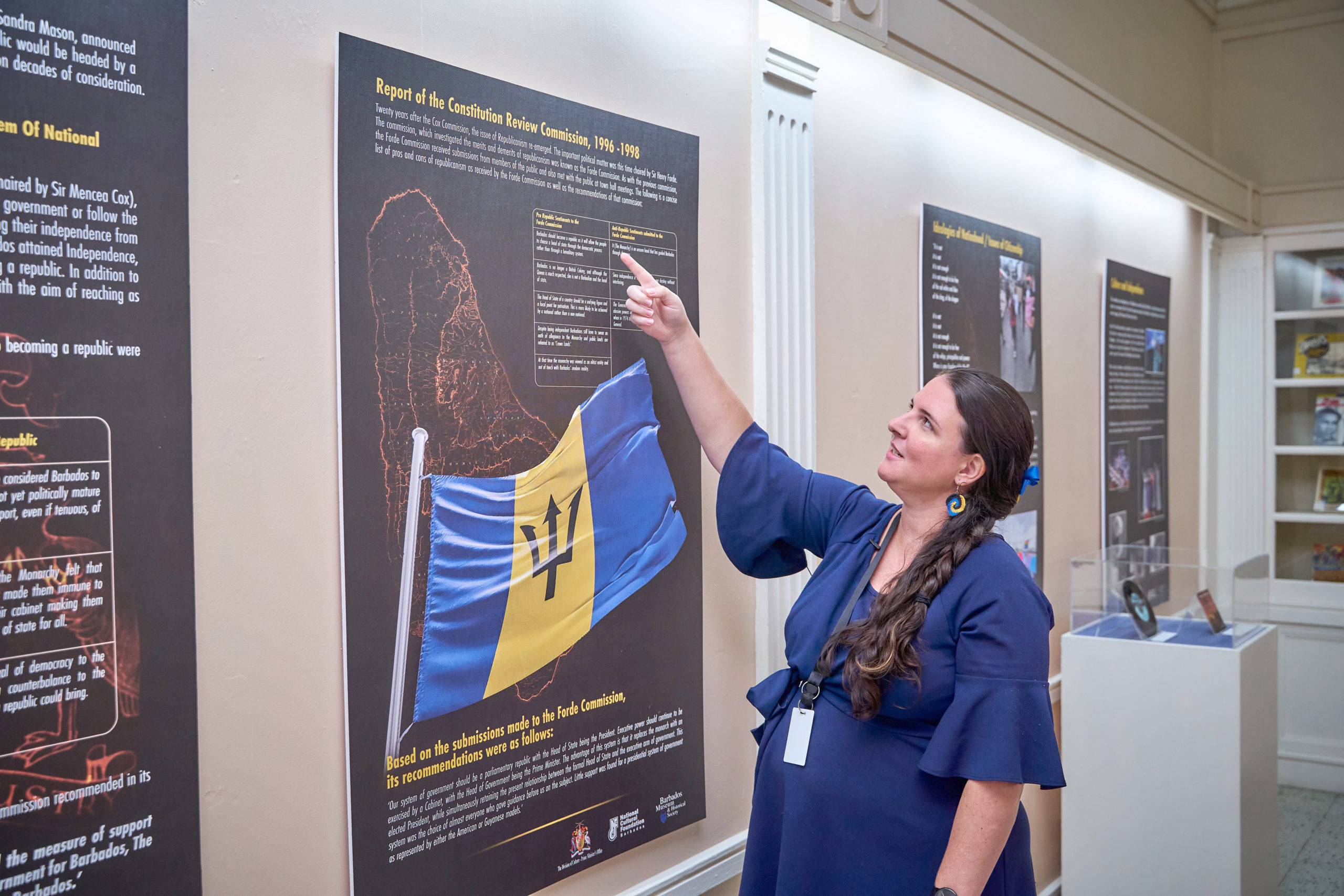By Shamar Blunt
“It is not enough to be free from the red, white and blue….”
This provocative excerpt taken from the poem, Negus, which was written by Barbadian poet, playwright and historian Kamau Brathwaite, reflects the struggles Barbadians have faced against the deeply entrenched colonial influences since the transatlantic slave trade.
That piece, alongside other installations, was therefore regarded as greatly appropriate to be included in the Road to Republic: 400 Years Of a Political Experiment exhibit, being staged at the Barbados Museum and Historical Society.

As the island celebrates its first year as a republic, Natalie McGuire-Batson, Curator for Social History and Community Engagement at the museum, told Barbados TODAY that the achievement was “actually a result of 400 years of policies, political movements, insurgency, black political intellectual traditions and culture, that led to this moment”.

The exhibit, which runs until the end of January 2023, tells that story.
From as far back as 1979, the Cox Commission on the Constitution was tasked with studying the feasibility of introducing a republican system. Though not successful in changing the mindset of many older Barbadians at the time, the results from the commission highlighted several issues with the monarchical system, according to McGuire-Batson.

“The results from the commission were fairly balanced. There were equal amounts of arguments for Barbados becoming a republic, such as the younger generation becoming increasingly disconnected from the idea of a monarchy. The further view was that the Head of State should be a Barbadian and a lot of younger Barbadians were more conscious of important issues, such as identity, race, and race relations, and were aware of some of the atrocities that occurred during the Windrush generation in the 1940s. They really felt that this stronghold to the UK was not appropriate for Barbados at the time,” she explained.

On the other hand, smaller sections of society felt that the island was not yet politically mature enough and, therefore, still required the “moral” support of the United Kingdom, despite the dark history in the relationship between the two nations.
The exhibit shows that almost two decades later, in October 1996, Sir Henry Forde was appointed as the Chairman of the Forde Commission which was created to outline if there was a need to retain the monarchical system of government, in addition to making recommendations in respect of the executive form of government most suited to protect parliamentary democracy.

After several public hearings were held in Barbados and overseas, the Forde Commission recommended that Barbados adopt its own parliamentary republic system.
Though the exhibit can be seen in many respects as a celebration of Barbados’ political will to break free from its challenging past, the pieces on display also do not shy away from the social action and uprisings that were often needed to trigger change.
As she looked at some of the protest placards on display, McGuire-Batson emphasised that the willingness to protest unjust ideologies has always been part of the nation’s history.
“This is another important instance of how social action influenced policy change. It was a culmination of a lot of unrest that was happening in Barbados at the time as a response to 100 years of low wages [and] poor housing conditions that really had not changed since the Emancipation Act had been passed 100 years prior.
“So, speakers such as Clement Payne were really rallying everyday Barbadians to protest and fight for their cause, and not just accept that these conditions were an acceptable way of life,” she said.
Though society has indeed come a long way, with education, voting, health, and other areas being cemented as fundamental rights for citizens, the country itself is still moving forward.
As McGuire-Batson pointed out, the transition to a republican status has not solved all the issues that existed in the post-Independence era.
“These include issues such as rights for LGBTQI communities, issues of naturalisation for CARICOM citizens in Barbados, culture policing in terms of clothing and hairstyles that still occur through some of our institutions here in Barbados. This is a momentous occasion and really needs to be a platform to now tackle some of these issues which are kind of lingering remnants from our colonial era,” the curator said.




